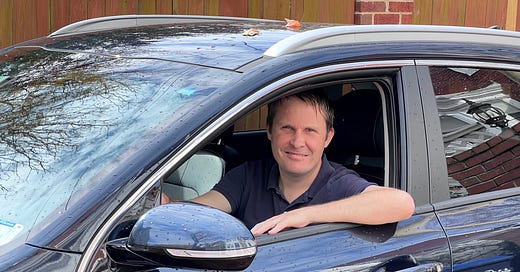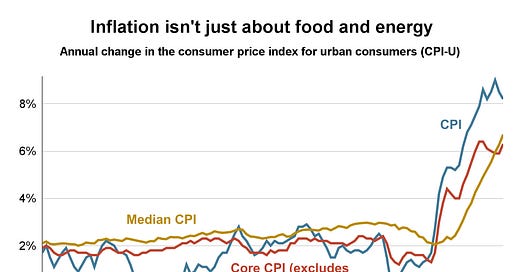Back in 2014, I drove for Lyft for a week and wrote about the experience for Vox. It was a popular article and gave me something to talk about at parties for months afterwards, so I thought it would be fun to repeat the experiment.
So yesterday I spent about nine hours behind the wheel of my Kia Niro EV ferrying passengers around the Washington DC and Baltimore metro areas. I’ll do a formal article once the experiment is complete, but here are some quick impressions from my first day:
I started around 2pm and wrapped up at midnight, with an hour-long break for dinner. I had 15 passengers and earned a total of $187, which works out to gross earnings around $20 per hour. Of course, that’s before you take into account the cost of electricity, depreciation, insurance, and other costs, so my net earnings will be lower.
If you’ve taken an Uber or Lyft ride recently, you’ve probably noticed that you have to wait longer than was typical in the 2010s. The converse is true for drivers, and in a big way. In 2014, I’d sometimes wait more than an hour between fares. Yesterday, Lyft would usually give me the option to queue up a new passenger before I’d even dropped the previous passenger off.
The bulk of my passengers were young people, and they did not seem interested in talking to me. Of the 15 passengers in my car, I only had three or four substantial conversations. I talked to a Korean grad student, a woman in her 60s, and a man who looked like he was in his 50s. And that was about it. Others would offer navigations suggestions or answer briefly questions I asked them, but the vast majority of Americans under 40 seemed to prefer to listen to music or look at their smartphones. This is totally understandable—I don’t necessarily like talking to drivers either—but it’s going to make it more difficult to write an interesting article. And it seems like a change since 2014, when I remember having in-depth conversations with a number of younger passengers.
When I’m doing a project like this, I think carefully about which details I can ethically share, because people don’t expect conversations with their Lyft driver to end up in a news article. For example, the 50-year-old was a man in the catering business, who at one point in his career was involved in catering for high-level political functions. He told me a funny story, the gist of which was that Republicans like to eat steak and fried chicken, while Democrats are more picky about what they eat. He shared a funny detail about a specific member of Congress, which would be a great addition to my piece, but I can’t use it without the risk of identifying my passenger.
Electric vehicles work phenomenally well as urban taxis. Our electric vehicle has a highway range of around 250 miles, which means that on road trips we have to recharge it every two to three hours. But yesterday I started my trip about 80 percent charged, recharged from 50 percent to 80 percent about halfway through the day, and ended the day at about 40 percent charged. I think if I’d started the day fully charged, I could have comfortably done 9 hours of city taxi driving without recharging. This is a reflection of the power of regenerative braking: every time the car slowed down, it was recapturing some of the car’s kinetic energy and putting it back into the battery.
Is there anything you’d like to know about my Lyft driving experience? Or stories you’d like to share about your own use of Uber or Lyft? Please leave a comment!















Compare the tip rate from 2014 and Friday?
About what did the 2014 run yield per hour vs Friday (somehow accounting for costs then and now)? Thanks
Interesting, I'm excited to read the full version of the story!
Meta note: This is a great lil extra for paying subscribers. I hope you do more "thoughts for future stories" posts. I like that it gives us an an opportunity to participate in the reporting process (e.g. if I knew a Lyft or Uber driver, I would certainly offer to introduce you to them) or pose questions.
You may already be aware, but /r/uberdrivers is a window into the grievances of rideshare drivers: https://www.reddit.com/r/uberdrivers/
It's pretty complaint-heavy so there's definitely a selection effect going on — people being more vocal when frustrated, as with reviews in general — but gives a feel for the stressors that come up.
Here's a question: Why'd you choose Lyft versus Uber?